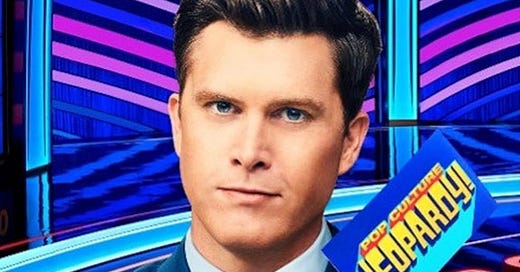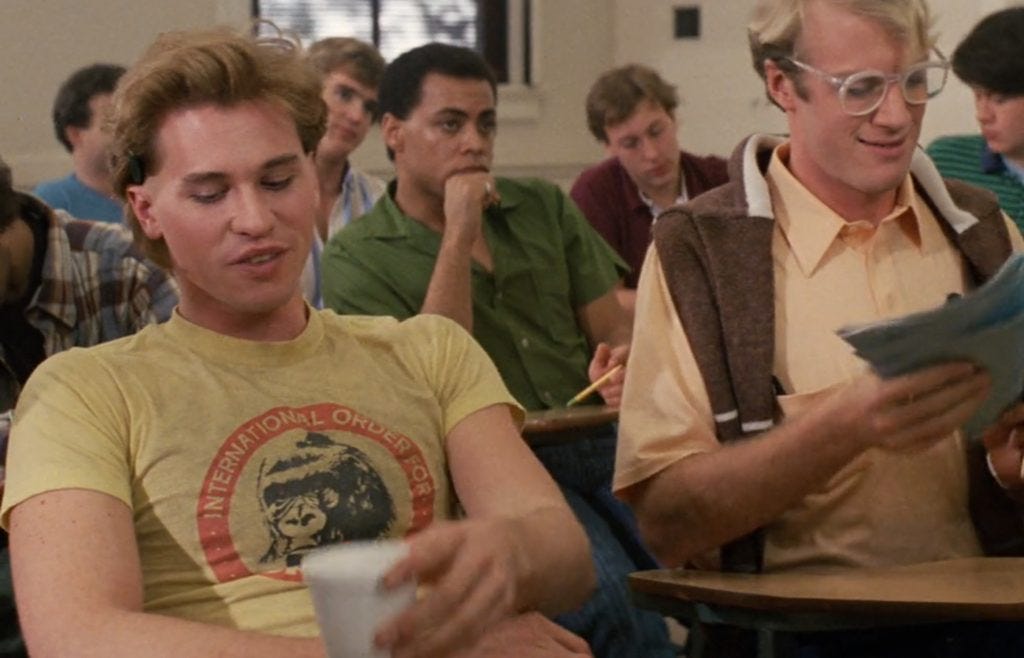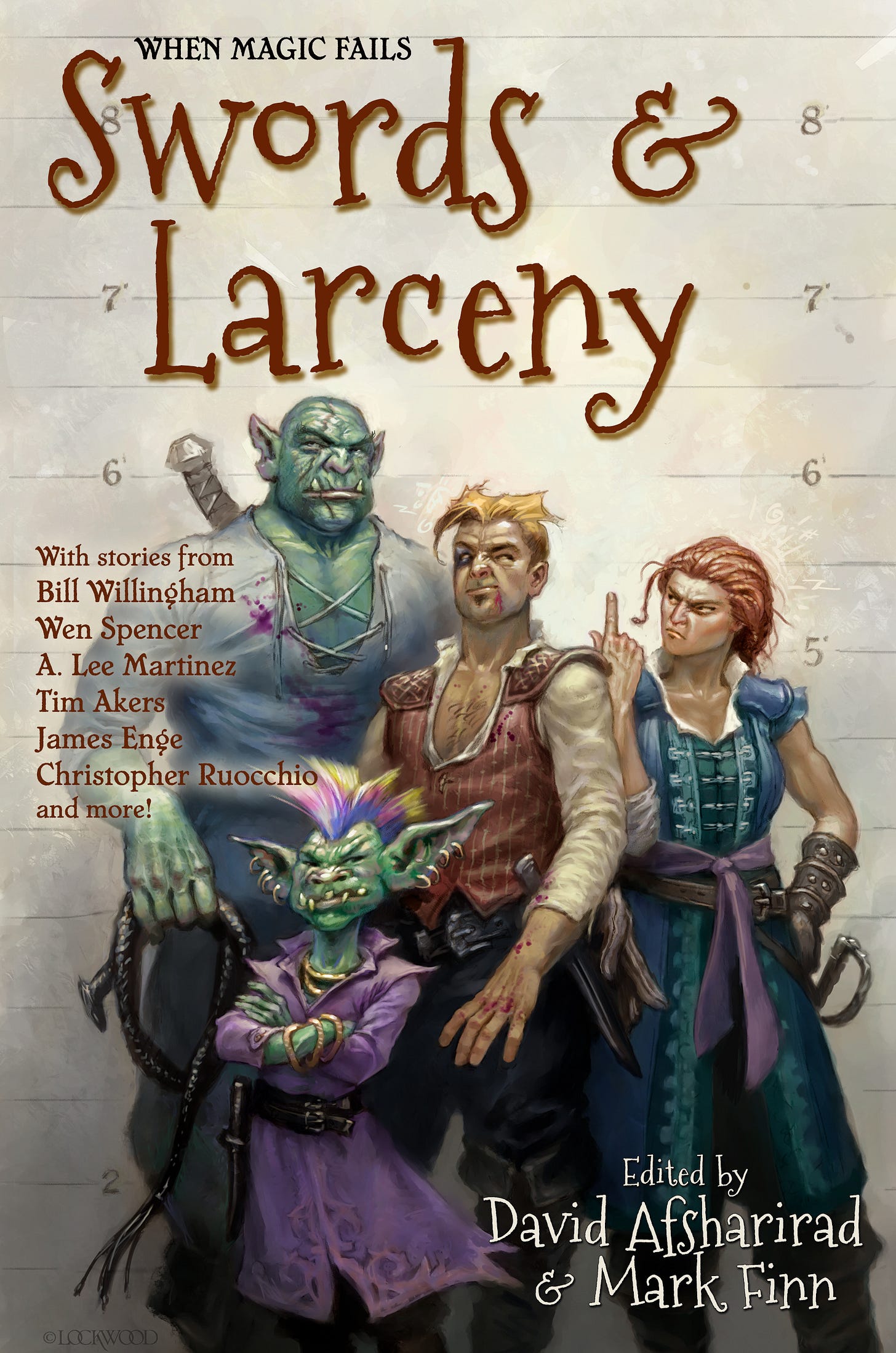Weekly Briefing from the North Texas Apocalypse Bunker, 4/24/25
Insert Pithy Comment Here edition
We’d like to start this newsletter by noting the passing of Val Kilmer (1959 – 2025), who was one of those actors that was “ours,” meaning, at a time when we were most impressionable, he starred in a number of touchstone movies that are really hard to extricate from Gen X nostalgia. I’m talking about Top Secret, and Top Gun, sure but also Real Genius, The Doors, and Tombstone, just to name a few. I personally love Kiss Kiss Bang Bang so much, I watch it once a year.
Looking back at a lot of actors and characters I’ve taken to heart over the years, I realized that I have always been a fan of the trickster folk hero, and that, coupled with the “slobs versus snobs” trend that informed most of my viewing choices in the 80s, had a gravitational pull on me and my personality. Put simply, I wanted to be Chris Knight when I grew up—witty, brilliant, unafraid to speak my mind, confident, with a healthy anti-authoritarian cynical streak. That was all Val Kilmer’s doing. I know Mitch is supposed to be our POV character in Real Genius, but come on. No one wanted to be Ritchie. We all wanted to be the Fonz.
Adults who were cool was not a new concept. Even though Bill Murray (for instance) was in his twenties, to someone who was thirteen years old, he might as well have been 100. James Garner was one of those guys who always seemed cool, no matter what part he was playing, but that was my father’s idea of cool. But Chris Knight in Real Genius...I was sixteen at the time. That character was graduating from college. That made him, what? Twenty-four? Striking distance. It wasn’t hard to see myself as Chris Knight, if only I was that smart.
That’s a through line in nearly all of Kilmer’s roles; he played smart, clever, interesting, fascinating people. In this way, he was a real genius. They also had a moral compass, if not a moral center, and they all (eventually) did the right thing at the right time, or because it was the right thing to do. He wasn’t the most prolific actor, but the parts he played mattered to a lot of people. He will be missed. Rest in peace.
Swords & Larceny Cover Reveal
I’m pleased—no, I’m tickled pink—to show you the gorgeous Todd Lockwood cover art for the forthcoming sword and sorcery anthology I co-edited, Swords & Larceny. It’s still on schedule for an October release from Baen Books. Pretty nifty, eh?
The NTAB Commissary is Open For Business
Took me long enough, didn’t it? This is just the start, of course, and considering that there is no longer a one-stop shop for everything, I will undoubtedly add links for additional sites down the road. For now, though, please swing over to Red Bubble and look at the meagre offerings therein. If you would like to “like” and “follow” the store, that would be great. If you’d like to buy a sticker or a mug or a t-shirt, that would also rock a phat jam, as the kids say these days. And, of course, feedback is always welcome and appreciated. The NTAB Commissary
Islands in the Stream: The Internet Sucks, Part 2
Growing up, I was a fan of Jeopardy! because it was on in the afternoon, when I was home, which is how we discovered all kinds of things. I always felt smart when I knew the answer to a question, and the more obscure the category, the better. But OH MY, did I ever feel insanely superior to those nervous geniuses staring blankly ahead only to have myself (and Alex Trebek) say, with emphasis, “I’m sorry, we were looking for ‘Who is Robert E. Howard,’ as the creator of Conan. Mitch, it’s still your turn, pick again.” Oh how I longed for a version of Jeopardy! that was all pop culture questions, because I knew I could win some serious bucks playing that. I even worked out my end credits “banter” for when Alex would drift over and you’d see him in a conversation with the winner.
Be careful what you wish for in 2025. We have that now: Pop Culture Jeopardy! on Amazon Prime, with Colin Jost filling the big Trebek shoes. Probably the most entertaining thing about the show is watching him wiffle ball miss nearly every joke he tries to land. Not sure how they are prepping the audience, but they need a new opener. As the show progresses, he gets funnier, and the cricket noises get louder and more pronounced. But that’s not the problem, here.
No, the problem is, there’s contestants on the show in their mid-twenties and there’s contestants on the show in their mid-fif...well, my age. I realize that as a fiftysomething person I’m middle-aged by anyone’s definition, but please believe me when I tell you that I don’t feel old, unless I’m standing up after a good night’s sleep. Mentally, I feel like I’m still in my 20s, even though I know that’s not true.
Regarding popular culture, I’ve got a wider experience than most, because I love jazz and the blues and black and white movies and cliffhanger serials and pulp fiction magazines, and comic strips, and art from the 19th century—basically, I’m a 97-year-old man insofar as my tastes are concerned.
None of that matters anymore, and not because it’s “so old,” or anything like that. Well, yeah, I mean, that’s the universal refrain of teenagers everywhere. But it used to not be like that. There’s an episode of The Brady Bunch where Peter decides he’s not interesting enough, so he starts impersonating Humphrey Bogart. Twelve-year-old kid. In 1971. Imitating an actor from thirty years prior. Everyone got the joke back then. It wasn’t a huge ask to expect the audience for The Brady Bunch to know who Bogart was. Even us kids, who maybe hadn’t seen The Treasure of the Sierra Madre yet, but we had seen all of those bad imitations in commercials and Rich Little specials and that Bugs Bunny cartoon where he gets hit with a pie, and all of that other stuff. Bogart was in the culture. He was of the culture.
Not anymore. You could see it on Pop Culture Jeopardy! whenever a question I knew the answer to was asked. There might have been one dad or mom buzzing in, but the twenty-somethings were clueless. Conversely, there were song lyrics from 2015 that I had no idea who sang them. And the answers didn’t shed any light for me. Even when I did know a singer, I wouldn’t know the lyrics. I was not a fan of Top 40 music in the 80s, but I damn sure knew the lyrics because I couldn’t not hear them everywhere I went.
What I thought was fascinating was watching them all be stumped over streaming shows that I had seen, but evidently, they hadn’t. And then it hit me. This balkanization of popular culture is the fault of the Internet. It started with music in the 1990s, thanks to Napster. Granted, it shined a light on a corrupt and unfair industry’s predatory business practices, but in doing so, the unintended consequence was that without the monolithic hold on who makes music, suddenly, there’s no way to hear any of it because it’s all coming from different directions and living in different places. I will never forgive the Internet for Justin Bieber, okay? I won’t. But the Biebers and the Gagas and the Eilishes of the world are outliers; for every one of them that ‘blew up’ there were a thousand that didn’t, and don’t, and never will. There’s more music to hear now than ever before, but how do you find it? Where do you go? To whom do you speak and get recommendations from?
Television is messed up, too. I’m pretty well plugged in, and I still miss good stuff all the time. Others in my circles do, too. We can’t keep our eyes on everything, because (a) there’s too much of it to properly ingest and just sit with and think about it for a hot second, and (b) it’s scattered across the vast swath of the Internet like a digital debris field. Who can afford to stream everything? Never mind that; who can afford satellite or cable?
Movies aren’t much better. The Oscars have borne that out for a couple of decades. In particular, the Best Picture category has been a catch-all for stuff no one outside of either coast has seen. I’m not suggesting that art house films and small studio films shouldn’t be nominated, but again, I’ll ask, where do you go to find them? For as long as I’ve owned the movie theater, I’ve railed against “Now playing in theaters everywhere,” when, in fact, the studios only “printed” a thousand copies of the movie, because they are playing an accounting game with the box office numbers, so only the highest grossing 1,000 theaters will premiere the movie on opening weekend. It’s even more galling when you consider that film isn’t printed anymore. It’s uploaded onto a hard drive and sent out—or, increasingly, downloaded from a satellite link in space. There’s no need to limit a release, but the accountants are in charge right now, so here we are.
All of this is sold to us on the illusion of choice. “Watch what you want, when you want,” sounds great, and is, but the streaming services are losing money and scrambling to lock up exclusive deals, meaning, if you want those sweet Office episodes, you gotta pay the Peacock. Apple music and Spotify? Meet the new boss, same as the old boss. That’s a song lyric, from the Who, see, they were this rock band...never mind.
I don’t have an answer for this state of being. I’ve just noticed that it’s become, on top of everything else, harder to connect with people via the conduit of popular culture anymore. We aren’t consuming the same media—as you know—and we seem to like that, even as we rail against the bubble that everyone else BUT you is trapped in. This, despite being the age of Great Connectivity. I’m sure they are working on an app for that.
Don’t mind me. I’m going to sit on my front porch, yell at the kids whizzing by on their hoverboards, and wait for the new show, Unpopular Culture Jeopardy! It’s like Pop Culture Jeopardy! except all of the daily doubles are sung by the Andrews Sisters and the categories include Big Band Trombonists, The Talkies, Who’s That Golden Age Animator, and Things We Used to Wear on our Belt.
Weekly Report from the N.T.A.B. Division of Media Review
Note: The matter of Walton Goggins’ weenus has been settled, as Goggins has admitted that the unit in question was digitally added, and not his real block and tackle. Considering how much it’s been shown in the last few episodes, I’m guessing that the digital dong (digi-dick? Oooh, I’ve got it: the E-rection!) is the most expensive thing about the show, and they had jet packs, for Pete’s sake.
So, I guess if there’s no actual, physical, flesh and blood nudity, it’s not worth mentioning, eh, HBO? You’re not fooling anyone, you know.
The Residence (Netflix)
An apparent murder at the White House during a state dinner brings an eccentric consulting detective into a web of in-fighting, personal squabbles, and a little bit of political turmoil.
It would appear that the Consulting Detective story is back for good, this being the latest in what is now a series of well-written and clever Whodunits to grace the zeitgeist in the last few years. Cordelia Cupp (Uzo Aduba) is, at first blush, a brilliant detective who does not suffer fools gladly, but she quickly establishes her bona fides as someone with an abundance of patience, a person who will let a silence play out so that someone else, usually the person she’s interviewing, will talk to fill the void, and say what they really mean. That’s just the beginning, though.
This series is a technical marvel to behold. With a cast so big, with so many rooms and suspects, it's going to be difficult for the audience to keep it all straight in their heads. Thankfully, we are treated to a lot of different points of view from other characters, judicious use of a drone for filming, and a virtual tour of the White House in the style of those old Dell mystery novels with the maps on the back that show you the pertinent locations and floorplans. I love the Dell mapbacks, and also, Rick Geary’s wonderful true-crime graphic novels wherein he takes a similar top down approach.
The Residence also makes good use of the flashback motif, not only as a storytelling device that allows us to see where multiple people are in a large scene, but also as a visual cue to remind us of certain events and people and places. It’s glorious and moreover, it keeps you engaged.
Finally, it’s a fair play mystery. You still need to use a little conjecture to spackle over some motivations, but it’s not heavy lifting and you will consider yourself very smart when you figure things out minutes before Cordelia explains things to Randall Park, in his best straight man role yet. There’s a lot of repetition from episode to episode to allow you to stay caught up with not only the new developments in the mystery but Cordelia’s thought processes as well.
There’s a rule in prestidigitation that says “a large action covers a small action.” You will notice a character who is played for laughs that is based on a public figure. Is it a dig? Of course. However, you might just miss a really subtle political message that is threaded deftly into the story, one that pays off at the end. You are free to tease that thread out and yank on it if you are so inclined, but it’s not necessary for your viewing enjoyment. That’s a neat trick, thanks to some clever and inspired writing.
The Residence is a hit. The all-star cast and the dynamic tension between Cordelia and Park (his character’s name is Edwin Park in a stroke of dumb luck) is a slam dunk. I haven’t been this engaged with anyone on Netflix in a while. If you like Poker Face, Only Murders in the Building, and the Knives Out movies, make this your weekend binge. You won’t regret it.










"There’s more music to hear now than ever before, but how do you find it? Where do you go? To whom do you speak and get recommendations from?"
I know I'll likely get dog-piled for saying it, but this applies equally to book publishing. It used to be said that 80 percent of the population firmly believed they had one in them to write, and thanks to Amazon et al. they're all now doing it. And publishing it. And a whole lot of it is either terrible, or (worse, in my educated opinion) desperately in need of a good professional editor. I know. I review them for a digital review magazine. And as you know but your followers likely don't, I've been editing and publishing books for 25 years.
I sometimes refer to it as "creative free-market libertarianism"—the firm belief, eagerly fostered by services like Kindle and the thousands of "support services" that have sprung up to feed off the gravy train, that everyone has the right to throw their work into the ring and let the reader/listener/art lover decide whether it's good or not. And now we have the AI services eagerly marketing themselves to those too lazy to do even that much.
Call me a crotchety curmudgeon, but it's frustrating. I have no objection whatever to self-publishing. Heck, when I first started my company I was accused of being a vanity publisher by no less a personage as Victoria Strauss. AFAIK, she still thinks so. This despite my spending hours editing and polishing and designing and formatting and marketing as much as I had time for, for each and every book I published. But the fact is thousands of potentially good writers are being ripped off because they have no clue what they're doing.
Okay, that's my rant for this week. I spend way too much time ranting these days when I should be editing chapters. 😉
I blame the Internet for the lack of old-time culture less than I blame the marketing majors who constantly insinuate that anything more than 5 years old might as well be from the Ordovician. It really struck me a few years back while waiting for a movie to start: the theater was running one of those prepackaged slides that look more and more like overproduced Powerpoint decks, complete with music and movie trivia, and NOTHING in the whole thing was older than two years. I know they were just trying to package the latest things, but how the hell do you have a movie trivia game that assumes its audience has never seen a movie older than their underwear?